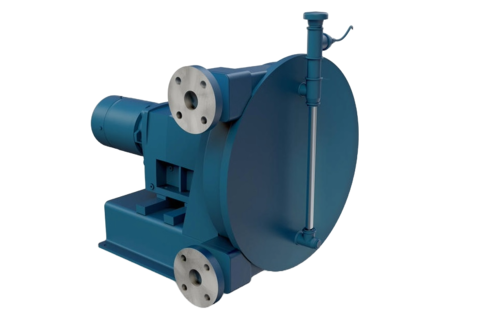
Wastewater
Flocculant Dosing
Targeted dosing of flocculants, especially polymers and ferric chloride
4 pump sizes - flow rates from 0 to 25 l/min - one foot print: Allweiler's AEB-DE Progressing Cavity Pump series for dosing applications is incredibly flexible and easier to incorporate than any other pump.
Targeted dosing of flocculants, especially polymers and ferric chloride, plays a central role in effective sludge treatment in wastewater treatment processes. The goal of the process is to make particles in the wastewater easier to separate by agglomerating them. Accurate dosing is required to avoid overdosing or underdosing, both of which can affect the efficiency of wastewater treatment. By optimizing flocculant dosing, Wastewater Treatment Plants (WWTP) can not only improve solids separation and thus treatment performance, but also contribute to environmental protection. Compliance with environmental standards and improvement of water quality are the main objectives. In addition, efficient dosing offers economic benefits by minimizing chemical consumption and reducing wastewater treatment costs.
Process explained
Targeted dosing of flocculants, especially polymers and ferric chloride, plays a central role in effective sludge treatment in wastewater treatment processes. The goal of the process is to make particles in the wastewater easier to separate by agglomerating them. Accurate dosing is required to avoid overdosing or underdosing, both of which can affect the efficiency of wastewater treatment. By optimizing flocculant dosing, WWTPs can not only improve solids separation and thus treatment performance, but also contribute to environmental protection. Compliance with environmental standards and improvement of water quality are the main objectives. In addition, efficient dosing offers economic benefits by minimizing chemical consumption and reducing wastewater treatment costs.
Pump Requirements
The pump selected for chemical dosing must be able to introduce precise amounts of chemicals, such as polymers, into the sludge at specific times. Precise control is very important to ensure that the chemicals are used to their maximum effect without the risk of over or under dosing, which could lead to degradation of the sludge quality. The pump must be able to respond flexibly to changes in sludge composition and adjust chemical delivery accordingly. In addition, the ability to accurately dose a wide range of chemicals, including flocculants to improve solids removal, is critical.
Our Solution for Your Challenge
Allweiler's progressing cavity pumps are specially designed for demanding chemical metering applications in sludge treatment. Their impressive pumping accuracy and resistance to corrosive media make them the ideal choice for this application.
This range is complemented by ALLMOVE® peristaltic pumps, which are specially designed for pumping difficult and sensitive media. These pumps require no seals or valves, which minimizes maintenance and wear.
Allweiler pumps provide the precision and flexibility needed to efficiently and safely introduce chemicals into the process, achieving optimum thickening while protecting the environment. With their reliability and cost-effectiveness, Allweiler pumps set the standard in sludge treatment.

Sludge & Polymer Pump Quick Selector Tool
Fast. Focused. Technically Reliable.
The Sludge and Polymer Pump Quick Selector is an intuitive tool designed to simplify the preselection of progressing cavity pumps for demanding sludge and polymer applications. By entering a few essential operating parameters, users quickly receive a technically sound pump configuration tailored to their process requirements.

Pump difficult media just as reliably as sensitive media in precisely metered quantities, no seals or valves needed. Maintenance and wear of these components are completely eliminated.
60
Max. Achv. Neg. Press. [bar] :-0,95
Max. Fluid Temperature [°C] :80
Max. Viscosity [mm²/s] :100.000

For dosing and handling high-viscosity, solids-laden fluids. We have combined proven and durable features from our proven industrial pump range with optimized rotor and stator geometries to ensure the highest dosing accuracy.
33
Max. Differential Pressure [bar] :24
Max. Fluid Temperature [°C] :100
Max. Viscosity [mPas] :28.000

Sewage transport is a critical process that ensures that domestic and industrial wastewater, as well as rainwater, is transported to the wastewater treatment plant efficiently and without harm to people or the environment.

Dewatering and preparing sewage sludge for further treatment is a particular challenge for wastewater treatment plant operators.